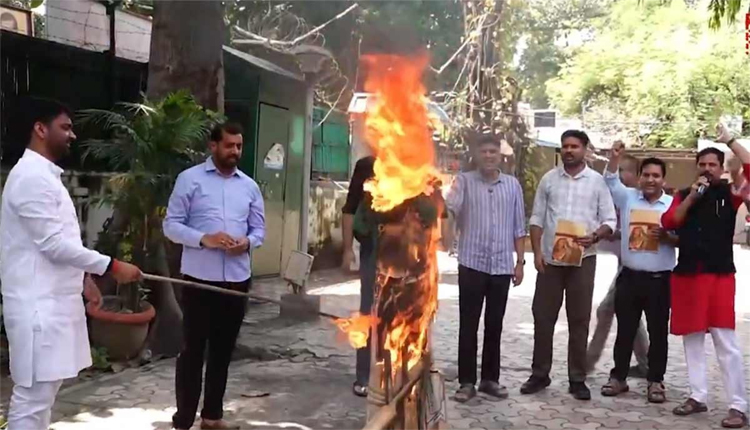Mew Delhi: Nationwide protests erupted on Sunday against the highly anticipated India-Pakistan clash in the Asia Cup 2025, as political parties and citizens alike decried the match amid fresh wounds from the Pahalgam terrorist attack.
Shiv Sena (UBT) took to the streets in Mumbai and across Maharashtra, while Aam Aadmi Party (AAP) leaders burnt effigies in Delhi, demanding an immediate halt to the game’s broadcast.
The controversy stems from the April 22 Pahalgam assault, which claimed innocent lives, followed by India’s retaliatory Operation Sindoor on May 7.
This marks the first cricketing encounter between the arch-rivals since those events, igniting a firestorm of outrage. Shiv Sena (UBT), led by Uddhav Thackeray, has written to Information and Broadcasting Minister Ashwini Vaishnaw, urging a ban on the telecast. Party workers roamed streets with collection boxes, symbolically gathering funds for the Board of Control for Cricket in India (BCCI) while questioning, “If no trade with a nation that spills blood, why play games? Blood and sport can’t coexist.”
AIMIM chief Asaduddin Owaisi lambasted the government, challenging the chief ministers of Assam and Uttar Pradesh: “Do you lack the guts to boycott cricket against Pakistan? Would you still play if your daughter was killed? Is the price of 26 civilians’ lives worth cricket’s money?”
Social media amplified the fury, with #BoycottINDvPAK and #PahalgamTerroristAttack trending on X, as users vowed, “No matches with those who murder our own.”
Film director and Indian Film and Television Directors’ Association (IFTDA) president Ashok Pandit termed the day a “black mark for the nation,” accusing the organisers of insensitivity. “Our cricketers should feel ashamed,” he said.
In contrast, World Hindu Raksha Parishad national president Gopal Rai supported the team, arguing, “India always wins. By playing, we show the world our power to crush Pakistan in one go. We stand with our players.”
In Delhi, AAP leader and former minister Saurabh Bhardwaj led workers in torching effigies of Pakistani players, calling the match a “grave insult” to widows of the Pahalgam victims. Aishwarya, widow of Kanpur businessman Shubham Dwivedi killed in the attack, appealed for a boycott, slamming the BCCI for ignoring grieving families’ sentiments.
As the match loomed, demands grew for cancellation, blending patriotism, grief, and politics in a charged atmosphere that could redefine Indo-Pak sporting ties.



Comments are closed.